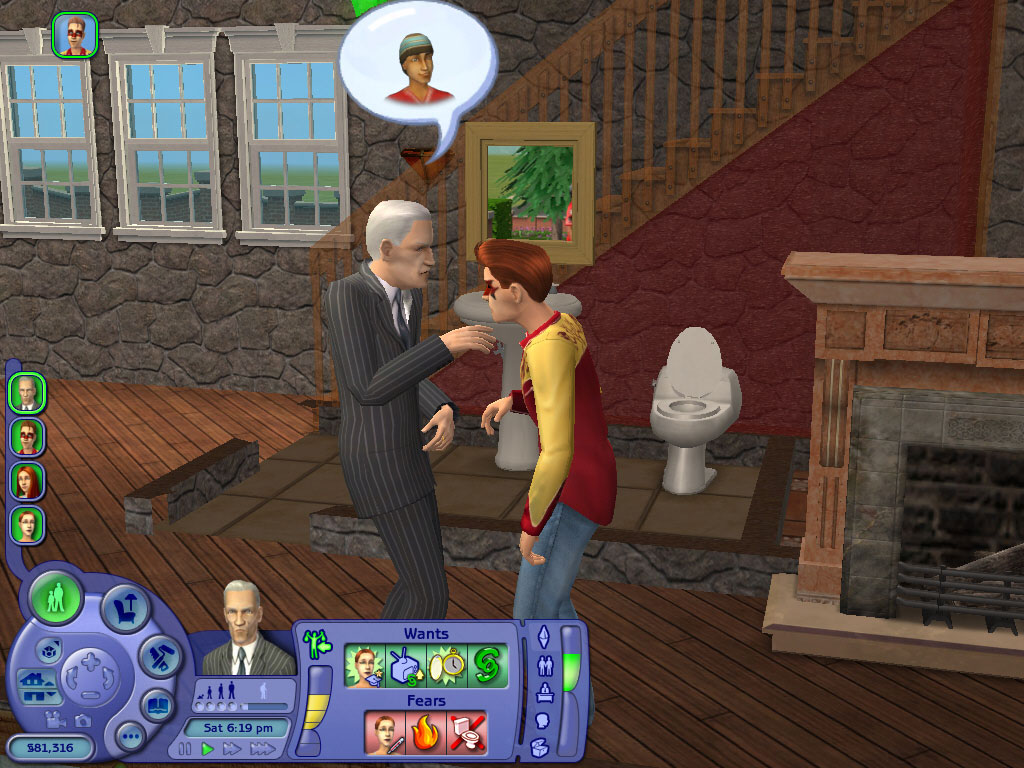Looking Back - Developing The Sims 2
What was it like developing, and finally finishing, the sequel to the best-selling computer game of all time? GameSpot goes behind the scenes to find out.
Another beautiful day dawns on...a ghost town? This isn't a deserted neighborhood in The Sims 2, but rather the offices of a game developer. Maxis' recently relocated offices on the Electronic Arts compound in Northern California are home to the team that created the most successful computer game in history, along with its sequel, but you wouldn't know it from the rows of mostly empty desks. It's the week before The Sims 2 hits store shelves, and only a handful of producers and other staff members are around, while the rest of the development team is off taking some well-earned vacation time.
Lucy Bradshaw, a Maxis vice president and the executive producer of The Sims 2, leads us through the office, past the team's surprisingly sparse game area, which consists of a television and a few consoles bounded by a lone chair and two beanbags. We settle into the nearest meeting room (called "Reticulating Splines" after the old SimCity/The Sims loading-screen message). "It's blissfully quiet," Bradshaw says, somehow managing to sound serene and timorous at the same time. Yes, the atmosphere is generally relaxed, though half of the team is still on call in case a serious, last-second issue appears in the game and needs to be fixed. Even at this late stage, EA's quality-assurance team is still combing over The Sims 2, arguably one of the most important game releases in EA's history.
We set down our camera equipment and prepare for an interview, and as we do, we can't help but notice that there's a very industrial feel to the Maxis offices--the cavernous rooms are dominated by concrete ceilings, exposed pipes, and ductwork. Yet the corridors and hallways are plastered with all sorts of posters, graphs, messages, and more. There's a giant wall (affectionately nicknamed "The Up-Against-the-Wall Wall") covered with sticky notes, each with a specific task that needed to be accomplished. All Maxis developers were responsible for checking the wall daily for issues they had to address--but they'd get the privilege of stamping an "It's done" note on it when they finished. Now, with the game on its way to store shelves, many have taken the opportunity to write victorious graffiti.

On one section of wall, there are clippings and articles from much of the mainstream press coverage that The Sims 2 has received. On another, there's a graph of the number of bugs in the project over the course of development. And there are already gaps in the walls--Maxis is preparing to make room for the next big thing. But Bradshaw won't reveal what that next big thing is. With a polite smile, the executive producer says, "There's so much territory that we can explore with The Sims." That's about as much as Bradshaw, or anyone else at Maxis, is willing to divulge at this point, though fans of the series can certainly expect that the sequel leaves room for future expansion.
Getting There
This is the aftermath of the recently completed sequel, The Sims 2. If you had been here just a few weeks ago as the game was nearing the end of its development, you would've seen these same desks full of bleary-eyed designers, producers, programmers, and artists frantically pounding away at a seemingly never-ending list of bugs that had to be squashed before the highly anticipated sequel made its way out the door.
The Sims 2's development apparently started in earnest some three years ago, in late 2001, when a team of about 10 developers began to lay the foundation for the sequel's highly enhanced graphics engine, making the jump from 2D environments to a fully 3D world with large, colorful 3D characters. Development picked up steam in 2002 and momentum continued to build as more and more contributors signed on to the project toward the end--not just producers and artists, but also localization managers and translators preparing for the game's simultaneous worldwide release.
But The Sims 2 wasn't the kind of game you could just throw more resources at--that is, finishing the game and polishing it up wouldn't happen just because there were twice as many people working twice as many hours on it. It's perhaps more true for The Sims 2 than for any other game this year that the devil was in the details. While players create a family of tiny people who talk simple gibberish, these characters are actually controlled by some very complex behavior. The game seems to effortlessly simulate simple behavior driven by physical needs and some surprisingly realistic behavior when sims with different values and goals start mixing things up, but this behavior needed to be tweaked, tuned, and balanced to infinitesimal margins. There's a very fine line between sims doing something that's surprisingly clever and funny, and sims doing something that's completely unrealistic and not especially entertaining.
The fact that these little people seem to go about their business according to their personalities--outgoing characters flirt with their neighbors, while aggressive ones pick fights--is actually the result of some very complex calculations going on behind the scenes. "[There's an] ungodly quantity of numbers in the game," assistant producer Hunter Howe admits. "Everything you could imagine in the game has some sort of number behind it, whether it's the price of a chair, or how much comfort that chair gives, or how [many] different types of sims want to use that chair...all these things have values, and that's what makes the simulator so complicated."

Howe and his colleagues spent countless hours fine-tuning the game's artificial intelligence to make sure it made sense in real life by creating a "happy log," which is basically a long list of data that gets dumped out of each sim's brain. Happy logs show how "happy" sims are-- the degree to which their needs are fulfilled and how badly these sims want to address their unfulfilled needs to be even happier. Howe recounts an incident in the game's early development in which, during a test session, a teenage sim watched a family member die, but needed to go to the bathroom so badly that he just got up without batting an eyelid and headed for the latrine--while his own flesh and blood shuffled off this mortal coil. The team would also occasionally find itself at odds with each other, especially when certain features would appear to be perfectly balanced to some, but completely out of whack to others.
The Home Stretch
Tuning The Sims 2 to make sure it was believable and worked as a game was already a big task for the team--sure, the game had to run well under the hood, but what about the exterior of the game, and the way players interacted with it. For instance, the team at Maxis continued to work on sims' self-awareness, or, as it's called internally, "receptivity." This feature is one of the ways the game breaks the fourth wall, so to speak--where sims actually communicate directly with players, realizing that they are in fact tiny characters in a game who are under your control. The most obvious example of this is when they're ordered to do something they don't want to do: When messy characters are ordered to clean up a pile of garbage, they turn and look up through the monitor at the player and complain, and the more such orders they receive, the more upset they get.
Making characters seem "real"--like autonomous beings who were actually so aware of their surroundings that they even knew who you were--was another critical goal for the team. Aside from the fact that they worked for weeks at a time crafting cinematic sequences to detail major events in the lives of sims, the team had to make sure the game encouraged players to try to connect with their sims as real characters, not just as tiny clumps of polygons onscreen. "In The Sims, sims didn't have facial expressions," assistant producer Thomas Vu explains, "but people imposed what they thought the sim was thinking." Since The Sims 2 actually does feature facial expressions, and more-articulated animation, the team attempted to develop the expressiveness that was only hinted at by the enthusiastic but now crude-looking character models in the first game.
And at all times, Maxis' producers kept an eye out for any opportunities to toss an extra joke or two into the game. "We love putting in little touches of humor," says Vu, who explained that the creative process often involved being handed several technical features by engineers--followed by producers and designers immediately asking, "What else can we do with this?" (Which would then be followed by Maxis staffers trying to sneak in extra secrets and jokes into each system.)

Of course, "What else can we do with this?" remains a very common question for the Maxis team, which is already at work on a new project. Maxis has added plenty of new features to its sequel, but it has also left many avenues open for new additions. Meanwhile, thousands of fans use the game's official Web site to exchange content and precreated characters. And thousands, if not millions, more will snap up the game at retail stores--it's the sequel to a notoriously successful game, and it may achieve the same level of success itself. Only time will tell.
Got a news tip or want to contact us directly? Email news@gamespot.com



Join the conversation